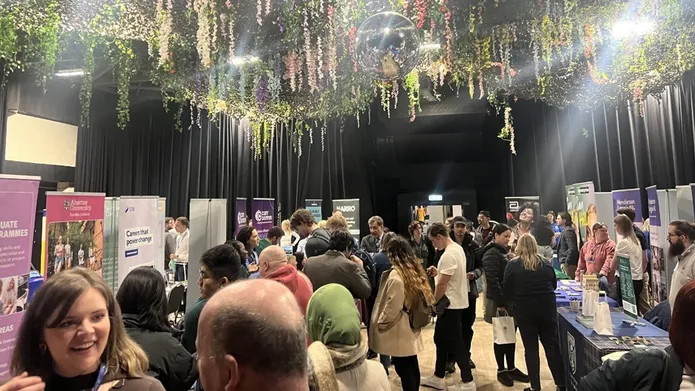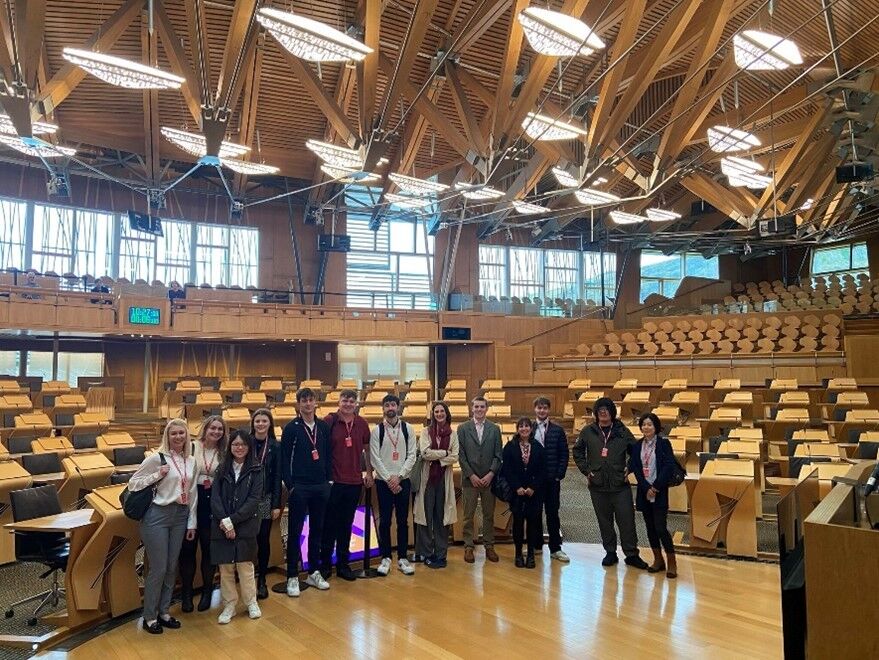News
Careers Service sees growth in employer engagement
The Careers Service at the University of Dundee is delighted to highlight a significant increase in partnerships with employer organisations eager to support and enhance students' employability
Published on 1 November 2024

2024 Main Careers Fair
This expanding collaboration showcases a commitment to preparing students for the modern workforce by offering a range of impactful interactions. Here’s an overview of some of the ways our employer partners are contributing to the academic and professional growth of University of Dundee students.
1. Engagement Through Recruitment Fairs and Events
Employer visibility on campus has never been stronger, with around 250 organisations expected to participate in recruitment fairs and pop-up events throughout the 2024/25 academic year. These events, such as the Legal Recruitment Fair, the Main Careers Fair, the Part-Time Jobs Fair, the Nursing Fair, the Volunteering Fair, and the Science and Engineering Careers Expo, allow employers to directly engage with students interested in specific fields. Each event provides a tailored platform where companies showcase their job openings, internships, and graduate schemes to motivated students seeking opportunities.
Additionally, organisations now have the option to host "pop-up" stands on campus in high-traffic areas, designed to catch students’ attention and create casual yet informative interactions. This initiative has proven highly effective in sparking interest and awareness among students regarding career paths and specific employers, building a robust connection between students and prospective employers.
2. Integrating Employer Expertise into Curriculum-Based Projects
Our employer partners play a vital role in enhancing academic programmes by introducing practical, real-world challenges into the curriculum. Two primary avenues for this are:
- Consultancy Projects: Employers set real-world projects that students work on, either individually or in groups, to develop innovative solutions. These projects provide a hands-on learning experience that bridges theoretical knowledge with practical application, sharpening students' analytical and problem-solving skills.
- Case Studies: Students tackle business challenges that employers are currently facing or have previously encountered. These case studies, often for academic credit, enable students to dive into industry-specific issues, better preparing them for their future careers.
Working closely with academic staff, employer partners ensure that students gain relevant, industry-aligned skills that go beyond textbook learning, making them well-prepared for the challenges of their chosen fields.
3. Offering Placements, Internships, and Voluntary Experiences
Internships, micro-placements, and voluntary opportunities remain a cornerstone of experiential learning, providing students with valuable industry exposure while building their professional networks. Key programmes include:
- Micro-placements: These 30-hour placements spread over a semester allow students to dedicate a half-day per week to hands-on work experience, typically as part of a level 2 internship module.
- Summer Placements: Lasting around eight weeks, summer placements are particularly popular among postgraduate students who integrate these experiences into their degree requirements.
- School Volunteering Programme: Through this initiative, students dedicate one afternoon each week to volunteering in local schools, enriching their practical experience while making a positive community impact.
Many degree programmes across the University already include work-based learning components to meet the requirements of professional accrediting bodies. These placements offer meaningful, career-aligned opportunities, helping students apply their classroom knowledge in a real-world setting while advancing their career readiness.
4. Interactive Skills Sessions and Industry-Specific Events
Beyond traditional recruitment, the Careers Service hosts dynamic skill-building sessions and interactive events that expose students to industry-specific insights and trends. This year, several unique events have added value to students’ university experiences:
- Industrial Seminars (School of Science and Engineering): Industry professionals share insights into career trajectories, technological advancements, and job opportunities, giving students an insider’s look at current industry developments.
- NCR Business Hackathon: Marking the University’s first non-technical hackathon, this event challenges students to solve business-related challenges presented by NCR. Participants compete by pitching their solutions, with winning teams awarded prizes for their innovative thinking and presentation skills.
- Green Careers Week: As environmental concerns continue to shape industry landscapes, this event features four panel discussions with themes like "Green Dundee with the Eden Project," "Sustainable STEM," "Ecotourism," and "Green Business/Consultancy." Each panel comprises industry leaders who discuss their journey towards sustainability, inspiring students to consider eco-conscious careers.
- Employability Week: 10 interactive seminars delivered with employer partners and alumni saw students learn about a range of crucial employability skills including application forms, interview techniques, use of AI in recruitment and networking.
- Masterclasses: Life Science students gain valuable insights by attending sessions led by experts who cover a variety of specialised topics relevant to the ever evolving field of Life Sciences.
- Student-Led Initiatives: By organising events like the Life Sciences Careers Conference, students take charge of their career development, creating direct connections with employers and gaining hands-on experience in event planning, networking, and industry engagement.
- Employer Visits: Hosting a group of employers is an excellent way for students to develop confidence in networking and get a glimpse of the workings of an organisation in a supportive manner. Employers can showcase their opportunities and inspire students through live demonstrations of their classroom learning.
These sessions offer students not only the opportunity to learn but also to engage with potential employers, ask questions, and explore potential career paths in a supportive environment.

UoD Students on a visit to the Scottish Parliament to observe the Finance and Public Administration Committee in October 2024
5. Mentorship Programmes to Build Leadership and Industry Knowledge
Mentorship continues to be a powerful tool in shaping students' professional identities and competencies.
- Leadership Mentoring Programme: Open to all students, this programme matches them with mentors to develop leadership skills. Students who successfully complete this programme can earn the Dundee Plus Award, showcasing their commitment to personal and professional growth. https://www.dundee.ac.uk/guides/leadership-mentoring-programme
- Subject-Specific Mentorship: Tailored programmes, like the LLB Alumni Mentoring Programme, connect students in specific fields with industry professionals. Law students gain insights from solicitors, advocates, barristers, and in-house counsel who provide guidance and advice on navigating the legal profession.
These mentoring schemes offer invaluable support, from career guidance to networking, helping students build relationships with seasoned professionals who can offer mentorship and direction as they transition into the workforce.
A Mutual Benefit: Building Employability and Raising Employer Profiles
The partnership between the University of Dundee Careers Service and its employer network goes beyond providing job opportunities. We want to ensure students gain critical skills, apply academic knowledge, and begin to plan and action their career aspirations. At the same time, employers boost their visibility and reputation among the University’s student body, cultivating relationships with future talent and expanding their reach within Dundee’s academic community.
Through continued collaboration, the University of Dundee Careers Service remains dedicated to preparing students for fulfilling careers while strengthening its connections with industry. Together, we are enhancing employability, fostering innovation, and making a tangible difference in the lives of our students and the broader professional community
For further information please see Careers Service support for employers
Ruth O’Riordan, Head of Careers Service ([email protected])